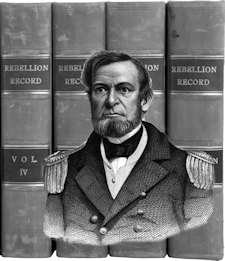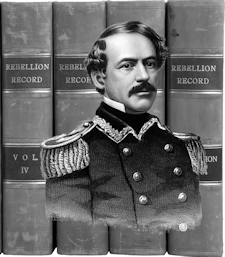January 1, 1862 —The year closed under gloomy auspices; with a check at Dranesville, and a rumored disaster in Missouri. The year which has begun opens with evil tidings. We fear that there is no doubt of the fact that the Northern Union has consented to the surrender of Mason and Slidell; and with that event all hope of an immediate alliance between the Southern Confederacy and Great Britain must cease.
Under other circumstances we might derive a consolation for the loss by considering the ineffaceable disgrace that falls on the enemy. Never, since the humiliation of the Doge and Senate of Genoa before the footstool of Louis XIV., has any nation consented to a degradation so deep. If Lincoln and Seward intended to give them up at a menace, why, their people will ask, did they ever capture the ambassadors? Why the exultant hurrah over the event, that went up from nineteen millions of throats? Why the glorification of Wilkes? Why the coward insults to two unarmed gentlemen, their close imprisonment, and the bloodthirsty movements of Congress in their regard? But, most of all, why did the government of Lincoln indulge a full Cabinet with an unanimous resolution that, under no circumstances, should the United States surrender Messrs. Slidell and Mason? Why did they encourage the popular sentiment to a similar position? The United States government and people swore the great oath to stand on the ground they had taken; the American eagle was brought out; he screeched his loudest screech of defiance—then
“Dropt like a craven cock his conquered wing”
at the first growl of the lion. This is the attitude of the enemy. It would greatly console us to contemplate him, did we not know that no new exhibition of insolence and cowardice could sink him lower in the world’s estimation. The United States have lost no character by an exhibition of poltroonery as yet unknown in the diplomacy of other nations. That country had already sunken beneath the reach of infamy. The only charge of bayonets made during the war by Lincoln’s soldiers, was that of Fairfax’s marines on Miss Slidell; and the surrender of her father at the first menace of Great Britain, will create neither more disgust or further surprise.
Nor can we hope for a popular revulsion in the Northern people against the folly and pusillanimity of their rulers. People and rulers are alike. It is only in the sentiment of England that we can find a ray of encouragement. It is certain that the British wanted war; that they were confident of getting it, and that they will be bitterly disappointed at the unsatisfactory result. Now, this result, though apparently due to the lily livers of the Yankees, is partially attributable to the management of the Palmerston ministry. That Cabinet gave Seward and Lincoln the chance of humiliation, when it could have taken redress with the high hand, and shut the door to apology by recalling Lyons, sending home Adams, and setting the British fleet at once in full sail for the scene of action. The Palmerston ministry is the friend of the North, and is directly antagonistical to the majority of the British nation. On these data we venture the prophecy that in less than three months this ministry will fall from power.
Whenever it does so, we may anticipate immediate intervention by Great Britain in the affairs of this continent. The inclinations and interest of that people are so closely united on this one point that we do not hesitate to declare the result a moral necessity. But for some time we may be left alone in this quarrel. Let us not repine, though the task be heavy on the arm. If we would respect ourselves, consolidate our nationality, insure our future independence, and transmit a heroic memory to posterity, we must prove to ourselves and to all others, that our own unaided strength is sufficient for our own redemption. If it is not, there remains one resolution, by which every citizen that is worthy of freedom can avoid the sight of its extinction and the spectacle of his country’s ruin — to die in the last ditch of their defence.—Richmond Examiner.
—Mason and Slidell left Fort Warren, Boston harbor, about eleven o’clock this forenoon. The arrangement for their return was very quietly made, and nothing was known at Boston in regard to the affair, until the hour arrived for their departure. The steam tugboat Starlight was employed by the Government to convey the prisoners to Provincetown, Cape Cod, where they were to be transferred to the British gunboat Rinaldo, which arrived at that port last night. Accordingly the tugboat Starlight left Boston shortly before ten o’clock this morning, and stopped at Fort Warren, where she took on board Mason and Slidell, and their two secretaries. After receiving their baggage, etc., the tug proceeded on her way to sea, leaving the fort about eleven o’clock. The whole affair was conducted without any display, in perfect quiet, and in the ordinary manner of conveying passengers. The tugboat reached Provincetown this afternoon, and the prisoners were transferred to the British gunboat, which immediately proceeded to sea.
—The Court of Inquiry, in the case of Colonel Miles, charged with being intoxicated at the battle of Bull Run, honorably acquitted him of the charge. The decision is furnished in a report of Reverdy Johnson and R. S. Gillett, in which they declare that the bulk of the evidence produced on the trial goes to show that the charges arc entirely false.
—The British prize bark Empress, of Hull, arrived at New-York from New-Orleans bar. She was bound from Rio Janeiro for New-York, as her captain reported, and had been ordered off from Pass a l’Outre previously, and was captured by the United States sloop Vincennes. She had a cargo of six thousand five hundred bags coffee.
—All the Yankee prisoners from Charleston, including Colonel Corcoran, arrived at Columbia, S. C, this afternoon, in a special train. They were met at the depot by the rebel-guard of this city, and conducted to prison.—Richmond Dispatch, January 3.
—The rebel batteries at Pensacola, Fla., having repeatedly fired at the national vessels, Fort Pickens opened on the rebel 6teamer Times, which was landing stores at the navy-yard today. The rebel batteries responded, and the firing was continued till evening, Fort Pickens firing the last shot The rebel guns were well aimed, and most of their shells burst inside of the fort; only one man was wounded, however. A shot from Fort Pickens made a large breech in Fort Barrancas. In the evening the National guns set Warrington on fire.—(Doc. 1.)
—The Knoxville (Tenn.) Register of to-day expresses the opinion that Parson Brownlow’s release was a great blunder, and gives the following reasons: In brief, Brownlow has preached at every church and school-house, and made stump-speeches at every cross-road, and knows every man, woman and child, and their fathers and grandfathers before them, in East-Tennessee. As a Methodist circuit-preacher, a political stump speaker, a temperance orator, and the editor of a newspaper, he has been equally successful in our division of the State. Let him but once reach the confines of Kentucky, with his knowledge of the geography and population of East Tennessee, and our section will soon feel the effect of his hard blows. From among his own old partisan and religious sectarian parasites he will find men who will obey him with the fanatical alacrity of those who followed Peter the Hermit in the first crusade. We repeat again, let us not underrate Brownlow.
—Twelve of the Buckner Guards, under Lieut. Hines, crossed Green River, Ky., twelve miles from Morgantown, surrounded a house in which four Federal troops were concealed, and took them prisoners. They got ten guns and the sword of Capt. Phelps, which he had left there. After recrossing the river, they attempted to arrest a man who had several times fired at the Confederate soldiers across the river. The man shot at Mr. Cook, one of the guides, but missed him, whereupon Cook shot him dead.—Bowling Green Courier, January 4.
—At Richmond, Va., there was a more general observance of “New Year’s” than usual, owing to the fact that the war had brought to that city a considerable addition to the population from other cities, where the anniversary is always a period of social festivity. The streets were thronged with ladies, and every body looked gay and cheerful. Among notable events of the day was the President’s reception, which commenced at twelve o’clock, and continued three hours. The President stood at the door of the large reception-room, and thousands of persons took advantage of the opportunity to give him a friendly grasp of the hand. Mrs. Davis was not present, but her place was well supplied by her sister, Miss Howell, Mrs. Col. Davis and Mrs. General Jones. The ceremonies of introduction were conducted by the President’s aids, Colonel Joseph Davis and Colonel G. W. C. Lee. The armory band was present, and every thing passed off delightfully. — Richmond Dispatch, January 2.
— A joint expedition of gunboats, under command of Commander C. R. P. Rodgers, and a column of infantry, commanded by General Stevens, left Port Royal Harbor, S. C., yesterday evening, and this morning proceeded across the Coosaw River, and shelled the rebel fort at Port Royal Ferry. On taking possession of the batteries, it was found that the retreating rebels had removed all their guns but one, though quite a number of shells were discovered in the magazines. Port Royal Ferry was immediately reopened by the Union forces, and the fort garrisoned by the Pennsylvania Roundheads. After its occupation, the rebels appeared in force and in line of battle, whereupon the gunboats opened upon them with shot and shell, driving them into the woods, and causing great havoc in their ranks. When the firing ceased, which was after sunset, a rebel officer was sent with a flag of trace, to ask permission to carry off their killed and wounded; but the gunboats reopened fire before General Stevens’ reply was obtained, which caused the rebel messenger to put spurs to his horse, and gallop off in hot haste.




